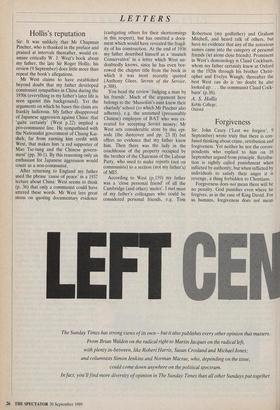LETTERS
Hollis's reputation
Sir: It was unlikely that Mr Chapman Pincher, who is thanked in the preface and praised at intervals thereafter, would ex- amine critically W. J. West's book about my father, the late Sir Roger Hollis; his review (9 September) does little more than repeat the book's allegations.
Mr West claims to have established beyond doubt that my father developed communist sympathies in China during the 1930s (everything in my father's later life is seen against this background). Yet the arguments on which he bases this claim are frankly ludicrous. My father disapproved of Japanese aggression against China: that `quite certainly' (West p.22) implied a pro-communist line. He sympathised with the Nationalist government of Chiang Kai- shek; far from earning him credit with West, that makes him 'a red supporter of Mao Tse-tung and the Chinese govern- ment' (pp. 30-1). By this reasoning only an enthusiast for Japanese aggression would count as a non-communist, After returning to England my father used the phrase 'cause of peace' in a 1937 lecture about China: West seems to think (p. 36) that' only a communist could have uttered these words. Mr West lays great stress on quoting documentary evidence (castigating others for their shortcomings in this respect), but has omitted a docu- ment which would have revealed the fragil- ity of his construction. At the end of 1936 my father described himself as a 'staunch Conservative' in a letter which West un- doubtedly knows, since he has even bor- rowed the chapter title from the book in which it was most recently quoted (Anthony Glees, Secrets of the Service, p.388).
You head the review 'Judging a man by his friends'. Much of the argument here belongs to the 'Mussolini's aunt knew their charlady' school (to which Mr Pincher also adheres), e.g. the unnamed (presumably Chinese) employee of BAT who was ex- ecuted for accepting Soviet money; Mr West sets considerable store by this epi- sode (the dustcover and pp. 23 ff) but offers no evidence that my father knew him. Then there was the lady in the coachhouse of the property occupied by the brother of the Chairman of the Labour Party, who used to make reports (not on communists) to a section (not my father's) of MI5.
According to West (p.159) my father was a 'close personal friend' of all the Cambridge (and other) 'moles'. I met most of my father's colleagues who could be considered personal friends, e.g. Tom Robertson (my godfather) and Graham Mitchell, and heard talk of others, but have no evidence that any of the notorious names came into the category of personal friends (let alone close friends). Prominent in West's demonology is Claud Cockburn, whom my father certainly knew at Oxford in the 1920s through his brother Christ- opher and Evelyn Waugh; thereafter the best West can do is 'no doubt he also looked up . . . the communist Claud Cock- burn' (p.38).
A. S. Hollis
Keble College, Oxford


























































 Previous page
Previous page